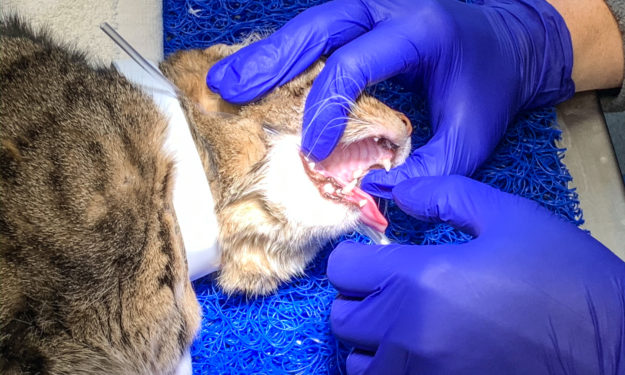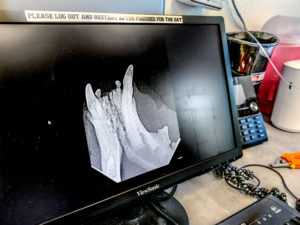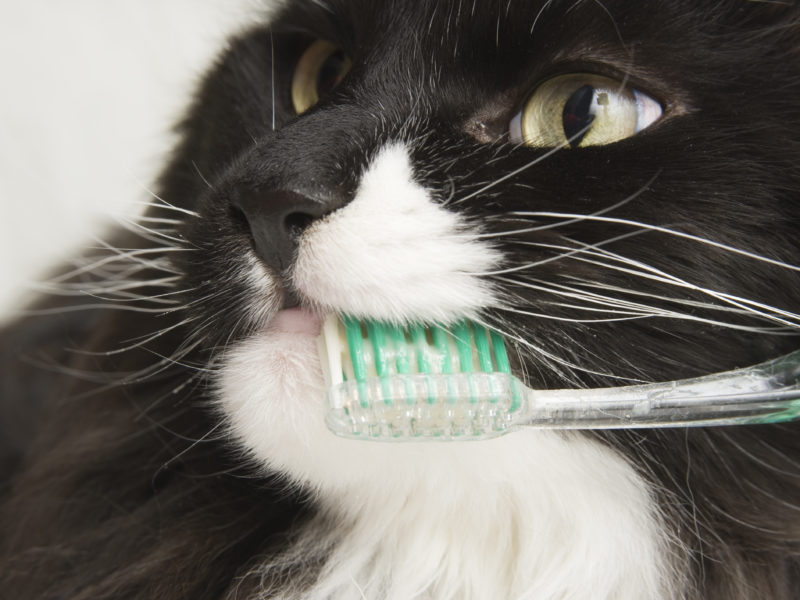Does My Pet Need a Dental?

When you think of going to the dentist, you probably have an image of a spaceship-like chair, some Top 40 radio station softly playing the same 7 songs, a spit sink, the smell of something fruity, and a rubber gloved hygienist asking you questions while both their hands are in your mouth.
What image do you have in mind when we say “veterinary dental”?
Although there is no reclining chair or sink where we ask your cat to swish and spit, veterinary dentistry suites have many of the same tools used in human dentistry: hand scalers, polishers, sonic scalers, x-ray, and extraction surgical packs.
However, because we cannot explain to the patient why we are doing something and ask them to stay still with their mouth open and tongue out, all dental procedures are done with general anesthesia.
Are my pet’s teeth diseased?
The quick answer is: ‘it depends’. Just like with humans, having good or bad dental health is partly genetic. Some pets luck out and never need a dental cleaning their entire lives, and others may need several moderate-several procedures including extractions. Besides good luck and genetics, there are some other factors that may dictate getting a dental:
- Small dogs: have the same number of teeth as a larger dog, but much less room in their mouths. This can be a perfect situation for plaque buildup in these tighter spaces and makes them more susceptible to needing dentals.
- Cats: similar to small dogs, they have smaller mouths and do not typically benefit from the act of chewing on toys to remove tartar. They are also more prone to certain dental diseases.
The easiest way to determine if your pet needs dental care is to bring up your concerns in their annual physical exam. A doctor will be able to evaluate the teeth in the back that we don’t keep an eye on daily. This is where most of the problems will live. Excessive tarter build up on premolars, molars, and fractured teeth can eventually cause tooth decay, bacterial traces entering the body, bad breath, and a decreased appetite.
Based on the findings in their physical exam, a doctor can determine the severity of the dental disease, and if they need a dental procedure. Minor tarter is expected and your doctor may say to, ‘wait a year and see’, meaning your pet may not need a visit to the dentist this year, but keep an eye on things and start a brushing routine if you can. Brushing our pet’s teeth is highly recommended, but in reality this doesn’t always happen. If we didn’t brush our teeth for a year we too could expect some issues.
These annual exams are extremely important for your pets overall health, however doctors do not have x-ray vision (although we sometimes think they do), and when your pet does go in for a dental, the x-rays will be able to tell a much better story of your pets teeth, which live mostly unseen below the gum line, and jaw health.
Does my pet need a dental?
Almost every adult dog or cat could benefit from a routine cleaning, but there is a tilting scale from a routine cleaning to a severe dental. A little tartar can be normal if your pet is otherwise eating and happy.
Here are some signs that your pet may need a dental:
- Bad breath
- Loose teeth or teeth falling out
- Discolored teeth (yellow/brown) and plaque buildup around gum lines
- Sensitivity (your pet doesn’t let you touch their mouth or yelps/cries if you do)
- Trouble eating hard treats or kibble (dropping food, taking longer to eat) or decreased appetite
- Pawing at mouth
- Swelling around mouth
What will happen to untreated dental disease?
Having a mouth full of bacteria is a very unhealthy life for pets. The bacteria does not just stay in their mouth, but instead travels down their throat and can start to make a new home in the body’s organs, causing more complications as they age.
Teeth may just fall out on their own. Once the decay eats enough of the tooth root, it can eventually fall out. This can cause concern for other issues including bone loss, resorptive lesions, abscesses, and retained roots. The time this takes for the teeth to get to this point can cause a lot of discomfort and possibly a decrease in appetite among other health complications.
What can I do to help keep my pet’s teeth healthy?
The best advice we could give would be to stay on top of your pets teeth throughout the year.
- Brush your pet’s teeth if you can, even if it’s not everyday
- Give them good chew toys
- Give them dental chews or treats
- Ask your vet about incorporating Hills t/d into their diet
And if your family veterinarian recommends a cleaning, most likely it is to save you from a moderate or severe (expensive) procedure down the line.
If your pet is one of the lucky ones with perfect teeth, celebrate now!
…Ok, that’s enough celebrating. Every dog, cat, and pocket pet will be different. Breeds and sizes of pets can also play a role in their dental health as well as the care we give like teeth brushing and safe chewing toys. If your pet has been getting a dental every year since they were five, don’t worry, you are not alone. Just know that each time you keep up maintenance on their mouths, their whole body stays that much healthier year after year.
Written by LAUREN PARECE, BS, DMCA, OMCP
